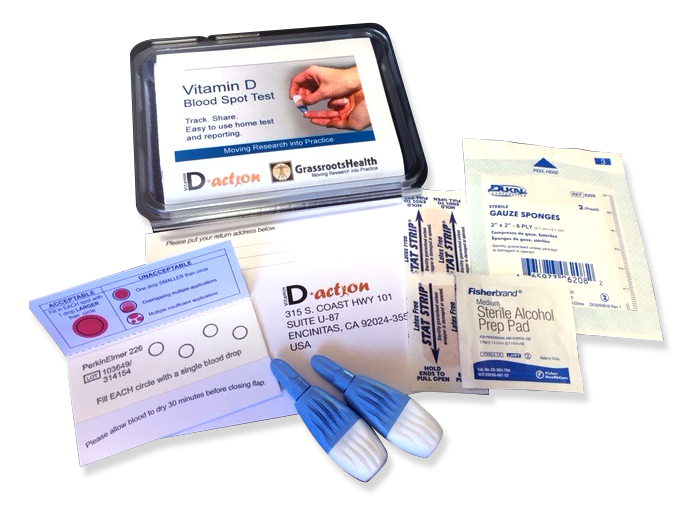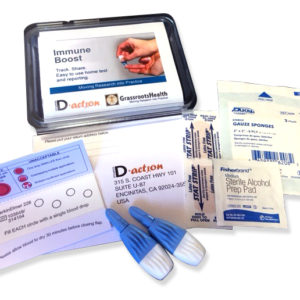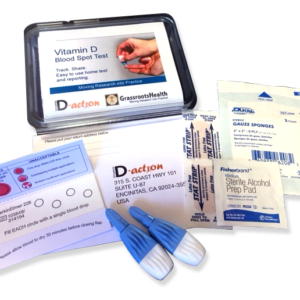Grassroots Health Vitamin D Test

Vitamin D Home Test Kit
From $79 — or subscribe and save up to 6%
Check your vitamin D levels and learn how it's affecting your health.
All tests provide enrollment in the GrassrootsHealth D*action projects. The information in the required questionnaire helps provide you and others scientific information to help you take charge of your own health.
SKU: GRH-TSTD-1 Category: D*action
You may also like…

Immune Boost Panel Test Kit
The panel kit includes a vitamin D test, Omega-3 Index test, Mg+Elements test and an hs-CRP test.

Custom Test Kit Builder
Build your custom test kit. The base kit includes a vitamin D test. Choose any of following tests to add to your custom test kit.
- Description
- Test Kit Contents
- Questionnaire Info
- Privacy
- Clinical Information
Included in the Vitamin D*action test kit:
- 2 lancets
- 1 Vitamin D blood spot card
- 1 envelope for returning the card
- 1 gauze pad, 1 band aid, and 1 alcohol swab
- Vitamin D literature
The most accurate determination of vitamin D status is the measurement of 25-hydroxyvitamin D, or 25(OH)D, in the blood. A Scientists' Call to Action has been issued by 48 international vitamin D researchers to alert the public to the importance of having vitamin D serum levels between 40 and 60 nanograms/milliliter (ng/ml) (100-150 nanomoles/liter, nmol/L) to prevent disease. Almost 90% of U.S. adults have vitamin D levels below that range! Use the D*Calculator to estimate an appropriate amount of vitamin D supplementation.
Vitamin D supplements taken in the same amount can produce hugely different blood levels in different individuals due to a number of dietary, lifestyle, and individual factors. The presence or absence of vitamin D cofactors (such as magnesium or vitamin K), malabsorption issues (such as a food intolerance), the time of day, whether you take your supplement with food, and whether you smoke or take prescription or over-the-counter medications will all influence blood levels in response to supplementation. It is important to remember that it is the blood level that has been related to specific health outcomes, not simply the intake amount.
The desirable blood range is 40-60 ng/mL (100-150 nmol/L). Testing, and re-testing 3-6 months after making your adjustments, is the only way to find out if you are in the target range for vitamin D.
Learn more about the importance of measuring your vitamin D level and research involving vitamin D.
Enrollment with the purchase of a Vitamin D*action blood spot test kit includes:
- 2-3 lancets
- Blood spot card(s) for the tests ordered
- 1 envelope for returning your blood spot card
- 1 gauze pad, 1 band aid, and 1 alcohol swab
- Vitamin D*action literature
When you order your kit, you will also be participating as a citizen scientist in the world's largest vitamin D project to solve the deficiency, D*action. You may choose to enroll for a 1-time test with your health information, or you may even participate in the 5-year project, where you provide your health information along with a vitamin D test every 6 months for the 5-year period. Your participation over the next five years will help build a body of science that will allow for tracking health care outcomes associated with vitamin D levels, and other important nutrients.
Questionnaire & Citizen Science
Becoming a participant of GrassrootsHealth means that you are joining thousands of people in collaborating with us on nutrient research. Citizen science welcomes everyone's participation in the discovery and sharing of scientific knowledge. As a citizen scientist, you can help everyone gain a better understanding of the role of nutrients in health and disease, and use the results to help inform public health officials to create change. Additionally, you can use your results to make informed decisions about nutrients that affect your health.Here's to the power of citizen science!
GrassrootsHealth could provide testing without asking you to fill out a questionnaire, but without that data we would have no way of measuring an effect. It would be a public service, especially back in 2009 when we started and it was hard to get a doctor to order a vitamin D test. But we founded GrassrootsHealth for more than testing. We founded GrassrootsHealth based on science, by first gathering together over 40 vitamin D researchers to form a panel of experts, then having those researchers come to a consensus on what the optimal vitamin D blood levels should be for general good health. The consensus they reached was for vitamin D levels to be in the range of 40-60 ng/ml (100-150 nmol/L). By asking about health, nutrient supplementation, and other exposures we can connect each participant's blood levels with their lifestyle and health status and help guide scientific answers to personal questions. In short, your data matters!
Learn more about the importance of the questionnaire.
Your individual health data will be kept confidential except for where required by law. The accumulated data will be stored in a secured, encrypted database operating behind a firewall, and password protected. The only person that will have access to the identified data will be our primary data biostatistician. This will be for purposes of accessing hospital records as indicated and released by participants, or for clarification of entries in the health questionnaire. The de-identified health information is shared so the research can be conducted, properly monitored and published. The Principal Investigator and other researchers will access the data in a de-identified form. For all analyses only an arbitrary number will identify the participant.
Vitamin D3 (cholecalciferol) is a prohormone produced endogenously from the action of ultraviolet light on its precursor, 7-dehydrocholesterol, in the skin, and is also commonly found in over-the-counter vitamin D supplements. Vitamin D2 (ergocalciferol) does not occur naturally, but is manufactured commercially by exposing ergosterol to ultraviolet light, and is the predominant form obtained by prescription in the US. Both are hydroxylated in the liver to form their 25-hydroxy metabolites (25(OH)D2 and 25(OH)D3), the major circulating form of vitamin D in the blood and the commonly accepted measure of vitamin D status. The blood spot assay is performed using liquid chromatography/ tandem mass spectrometry (LC-MS/MS), the same method used by the CDC Nutrition Laboratory to obtain accurate 25(OH) D values. Method accuracy is ensured by standardization with the NIST vitamin D standard reference materials. Circulating 25(OH)D3 levels reflect endogenous production as well as vitamin supplementation, whereas 25(OH)D2 levels reflect the results of Vitamin D2 supplementation. Vitamin D2 is believed to be less bioactive than vitamin D3. Vitamin D deficiency is linked with many chronic diseases, including autoimmune diseases, diabetes, cardiovascular disease, and cancer. Optimal levels of 25(OH)D3 are 32—100 ng/mL.
Grassroots Health Vitamin D Test
Source: https://daction.grassrootshealth.net/product/vitamin-d-home-test-kit/







Tidak ada komentar:
Posting Komentar